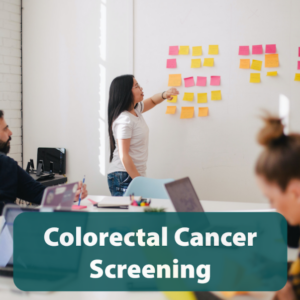Increase colorectal screening rates to 80% in every community
 The Priority
The Priority
Colorectal cancer is the second leading cause of cancer death n the U.S, for men and women combined. Colorectal cancer is highly preventable and treatable if detected early. Screening at the recommended intervals can detect precancerous polyps so that they can be removed before they turn into cancer. Screening also allows us to find cancer in its early stages, when treatment is more likely to be successful. Most adults should begin getting regular colorectal cancer screenings when they turn 45.
Unfortunately, too many individuals remain unscreened. Nearly 1 in 3 people who should be screened are not up-to-date on their colorectal cancer screenings. For some it may be a lack of awareness. But, for others, i.e. people in certain racial and ethnic groups, people living in rural communities, people with limited financial resources, and others, lower screening rates are also due to structural and financial barriers, limited access to quality screenings, and other social determinants that may lead to poorer cancer health outcomes.
This priority workgroup focuses on increasing colorectal cancer screening to 80% in Every Community by supporting and enhancing existing and new public health partnerships. The coalition-based approach to cancer prevention and control has proven effective time and time again, particularly when addressing the issues that affect the health of our communities. Now, more than ever, CCC programs and coalitions play a critical role in promoting colorectal cancer screening messages and activities in community settings across the United States. In addition, CCC programs and coalitions are uniquely positioned to plan and support activities to remove barriers to screening to achieve the 80% in Every Community goal. Together, we can increase awareness about colorectal cancer screening and make it accessible, affordable and convenient in every racial/ethnic community, a faith community, a workplace community, a rural community, etc.
What We Do
To help prioritize colorectal cancer screening and make it accessible to all, the Comprehensive Cancer Control National Partnership (CCCNP) formed the 80% Colorectal Cancer Screening Workgroup to help CCC programs and coalitions identify strategies to leverage their partnerships and resources to increase screening rates. This workgroup aims to assist CCC programs and coalitions in their critical ability to convene the appropriate partners (i.e. health care providers, health systems, communities, businesses, faith-based institutions, community health centers, state and local government, survivors, and others), build appropriate momentum, and generate collective support in every state and several tribes and US territories.
Resources
With support from CDC’s Division of Cancer Prevention and Control and Kaiser Permanente Center for Health Research, NACDD has launched a Mailed Fecal Immunochemical Test (FIT) Online Course to help increase colorectal cancer screening rates in diverse healthcare settings.
Mailed FIT is an effective screening strategy for colorectal cancer because it has been shown to increase population screening rates, is relatively low-cost compared to colonoscopies, and patients can complete the tests in the convenience of their homes.
The free online course provides healthcare professionals with easy-to-access information in video form. The videos cover all phases of a mailed FIT outreach program, including getting started, selecting a FIT kit, population selection, advance notifications, mailing FIT kits, sending reminders, processing received samples, following up on abnormal results, and sustaining the program.
The Mailed FIT Online Course gives step-by-step instructions on how to design and implement a successful Mailed FIT outreach program, including clinic preparation, a flowchart of operational steps, and recommendations for follow-up. The course also provides testimonial videos from three clinics and includes a variety of helpful resources for implementing mailed FIT programs, a companion workbook, and a messages guide for use in promoting the training to partners.
The U.S. Cancer Statistics Data Visualizations tool provides colorectal cancer incidence and death counts, rates, and trend data; survival and prevalence estimates; and state-, county-, and congressional district data in a user-driven format. The Centers for Disease Control and Prevention (CDC) and the National Cancer Institute (NCI) have combined their cancer incidence data sources to produce these statistics. Mortality data are from CDC’s National Center for Health Statistics (NCHS) National Vital Statistics System (NVSS). The Tool also provides colorectal cancer screening rates for every state, for all races and ethnicities, male and females (USCS Data Visualizations – CDC ). These model-based estimates are generated using BRFSS. Users can also click on each state for county-level screening rates.
CDC supports cancer control programs and coalitions in every state, several tribes and tribal organizations, and US Territories and Pacific Island Jurisdications through its National Comprehensive Cancer Control Program (NCCCP) | CDC . These coalitions work together to prioritize the implementation of activities to prevent cancer, find and detect cancer early (including colorectal cancer); increase access to quality treatment, and improve the quality of life of cancer survivors in their state- or jurisdiction-wide strategic Comprehensive Cancer Control Plans | CDC.
The NCI provides a database of evidence-based programs for colorectal cancer screening that allows you to search by population of focus, delivery location, community type, age, sex, and race/ethnicity, as well as by whether materials are available on the website.
GW provides toolkits designed to help partners communicate about colorectal cancer via social media.
In partnership with Kaiser Permanente Center for Health Research, and with support from the Centers for Disease Control and Prevention, NACDD has created a new resource designed to help increase colorectal cancer screening rates – the Mailed FIT Guide. The guide provides step-by-step instructions for planning and implementing a mailed FIT outreach program.
